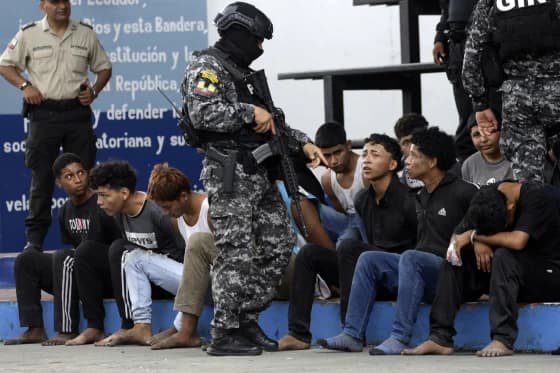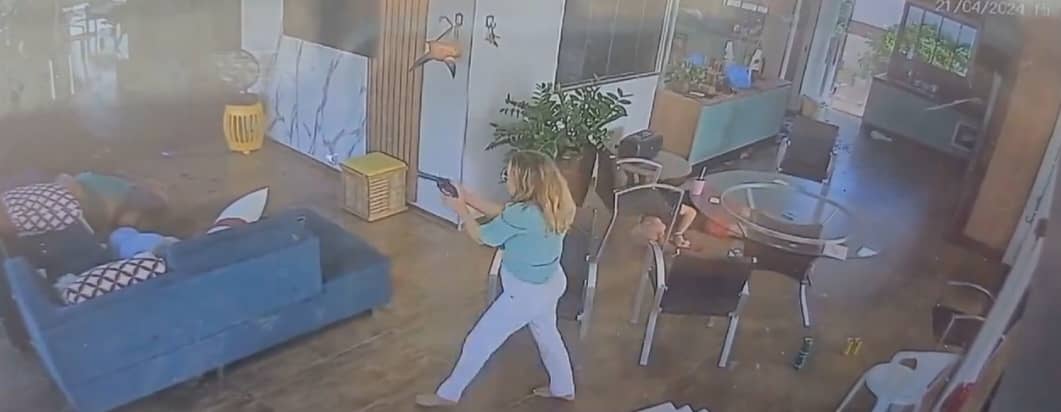SÃO PAULO, Brazil – One week after a drug lord escaped from prison and detonated an unprecedented crisis of violence in Ecuador, the South American country still suffers an overall atmosphere of insecurity, with businesses closed and a nationwide curfew.
Catholics in the Latin Anerican nation, who make up an estimated 77 percent of the population, have been asking for peace and working to mitigate some of the damages caused by the chaotic circumstances.
After the leader of the gang Los Choneros, Adolfo Macias, known as “Fito,” ran away from prison last week, a wave of violence exploded in Ecuador. Seven penitentiaries were taken over by inmates, who maintained 178 prison staff as hostages till they were released between January 13-14.
Terrorist explosions have been reported in several cities, as well as kidnappings. At least ten people died as a consequence of such attacks. On Jan. 9, armed men got into a TV station and held several journalists hostage for two hours. The entire action was broadcast.
President Daniel Noboa decreed a state of emergency and deployed troops and police to operate in all parts of the country. More than 1,300 suspects have been arrested, including 143 people accused of perpetrating acts of terrorism.
On Jan. 12, cities such as Quito, Guayaquil, and Cuenca still had part of their businesses closed and the streets empty. City buses have been working only sporadically.
The Church has been active on many fronts since the crisis erupted.
On Jan. 9, the Bishops’ Conference released a statement in which it invited all Ecuadorians to unite against violence and to make the nation a place “of peace, work, and fraternity again.”
“Every activity against the law, in any stance of society and of the State, must be considered an act of treason against the nation, against the most sacred values of our Ecuadorian identity, and against God, who will be the Judge of our lives,” the note read.
Archbishop Luis Gerardo Cabrera of Guayaquil told Crux that Catholics all over the Andean country have been calling the people to pray “for wisdom in order to keep hope and stay strong during the current hardships.” While God’s help is determinant, “it’s up to us to deal with those problems,” he added.
“That is a rather serious situation and it will take time for it to be solved. As an episcopal conference, what we could do was to ask for peace and dialogue,” Cabrera, who heads the conference, told Crux.
He said that one of the main causes of violence in Ecuador is “the poverty which impacts hundreds of thousands of people.”
“Poverty doesn’t justify violent acts. But poor young people are an easy target for the armed groups that hire them as hitmen. They can’t find stable jobs and end up involved in those actions,” Cabrera affirmed.
According to Father Luis Enríquez Sigcha, who worked for years in poor communities of Guayaquil, over the past few years poverty has been intensified by former President Guillermo Lasso’s policies.
“He cut the social aid from the poor and failed to find ways to help them. The COVID-19 pandemic further worsened their situation,” he told Crux.
In that context, big drug cartels found a way to increase recruitment among the poor and extended their control over vast territories, Enríquez said.
“Corruption in the state contributed to give them more and more power,” he added.
Cabrera also blamed corruption for the growing strength of the criminal gangs inside and outside the prisons. The government says it has been monitoring 22 such groups.
“Violence in prisons and on the streets has been increasing year by year. That has been the last straw,” he said.
Since 2020, at least 450 inmates have been killed in penal facilities. Bloody riots in penitentiaries in Guayaquil and Quito have been frequent.
Giovanni Dutan has been working as a volunteer in the prison pastoral ministry in the city of Cuenca over the past 12 years. He said that over the past eight years the group managed to form basic ecclesial communities in every bloc of the Turi penal facility, which has about 1,200 inmates.
Turi was taken over by the criminal gangs last week, and about 50 guards and workers were kept as hostages. Dutan and his colleagues followed the entire situation through virtual communications with Catholic inmates.
“They had to hide their cellphones during the day, otherwise the gangsters would take them. But at night we would send them messages of hope, prayers, and listen to their needs,” he told Crux.
During the crisis, the prison pastoral ministry had to deposit money in some of the Catholics prisoners’ accounts, because the gangs were demanding financial contributions from all inmates for food and other basic needs.
“We had to help them to avoid problems, so we sent them the money,” Dutan said.
That kind of racketeering is frequent inside the penal facilities. Every week, inmates have to buy bread and other food items, such as chicken, from the gang lords. All products are overpriced and they have to take more than they need.
“There is a direct connection between those gangs and the armed forces. Only a small percentage of the inmates are gangsters, but they control all the rest,” Dutan said.
On January 12, the prisoners at Turi were ready for the invasion of the prison by the military. All over the country, human rights organizations and the Church were negotiating the release of the hostages, who were gradually freed till Sunday.
During the weekend, the armed forces finally decided to invade the seven prisons that were under control of criminals. Dutan said that the Catholic inmates, as well as all the others, suffered violence.
“Unfortunately, the police and the military usually violate their human rights,” he said.














